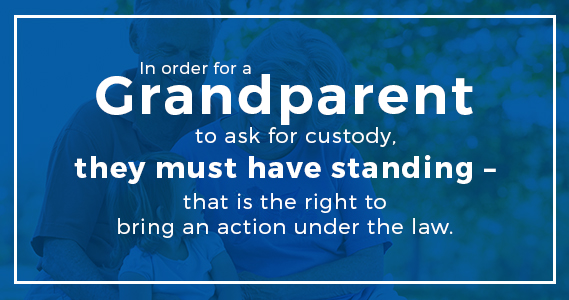Written By: Brandy Miller | December 28, 2016 | No Comments
The end of a relationship is a difficult experience for everyone involved. It can be even more stressful if you have children together and must therefore determine custody moving forward. As there are specific procedures and rules in custody actions it can be helpful to seek advice from law experts in the field of child custody.
According to the American Psychological Association, between forty and fifty percent of marriages in the U.S. end up in divorce. Many of these failed marriages involve child custody issues.
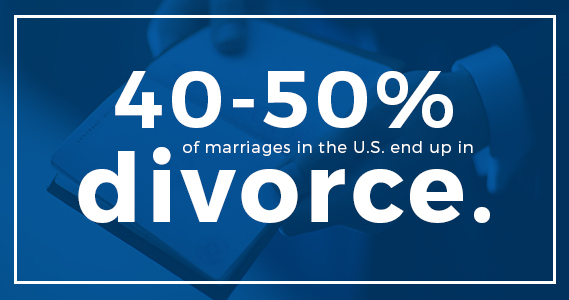
Introduction to Child Custody
In all child custody cases, the law requires that the best interests of the child be protected. The best interests of the child are determined by weighing sixteen different factors set at §5328 of the Pennsylvania Child Custody Law.
Determining a workable child custody arrangement can be a difficult process for couples who have children together. The impact of a family split on a child is something that should not be taken lightly. Your child may feel powerless in the face of the upheaval surrounding them. They may not be happy with the prospect of going to a new home, and the stress can even cause problems with the relationship with one or both parents.
To navigate what can be a very difficult time for you, and to make sense of the often confusing child custody laws, it is crucial to speak with an experienced family law attorney. As child custody lawyers near Reading, PA, we at Miller Law Group, PLLC are here to help.
There are various types of child custody arrangements, including:
- Shared Physical Custody
- Primary Physical Custody
- Partial Physical Custody
- Sole Physical Custody
- Supervised Physical Custody
- Shared Legal Custody
- Sole Legal Custody
This guide explains the types of child custody available to you and your ex, the pros and cons of each, and how child custody lawyers near Reading, PA can help you navigate these waters.
Physical Custody
Physical custody is the right to have the child live with you or under your care. This is distinguished from legal custody which is described below. It is important to know the difference before you begin your case.
If you are awarded sole physical custody, the child will live only with you and the other parent will not be entitled to any custodial time with the child. This situation is rare and usually only happens in situations where there is substance abuse, neglect, child abuse, mental instability or a history of violence.
The more common scenario is shared physical custody in which each parent has the child live with them for some set amount of time (every other week; certain nights and weekends, etc.). The parent who has the majority of the physical custody time is deemed to have primary physical custody while the other parent has partial physical custody. If there are concerns with a parent’s fitness to care for a child, they may be granted only supervised physical custody, which means that someone must oversee the parent’s time with the child.
Shared Custody Agreements
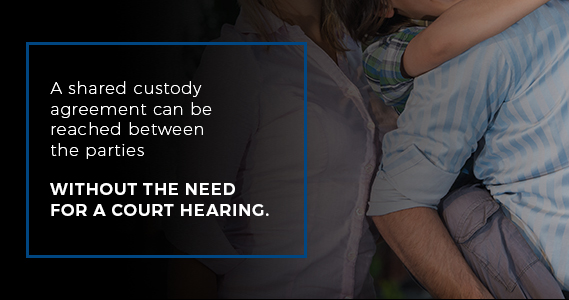
A shared custody agreement can be reached between the parties without the need for a court hearing. If the parents can agree on how to split the time, an attorney can draft the agreement and submit it to the Court to make it an official court order. This can be a positive to the parties as it saves on costly legal bills and the parents are free to decide how to split the time with the child, but it can still have the enforceability of a court order.
Bird’s Nest custody is a special kind of custody arrangement in which the child lives in the former marital home at all times, and the parents take their custodial time with the child in the marital home, while maintaining their own separate residences for their non-custodial time. This can obviously put a lot of stress on the parties as three households must be maintained, including joint decisions on the former marital home.
Legal Custody
Legal custody is the right to make major decisions on behalf of the child, including, but not limited to, medical, religious and educational decisions. Legal custody also grants that parent the right to receive medical and educational information from doctors, teachers and other providers.
Legal custody can be either sole or shared, with shared being more common. This means that both parents are entitled to make major decisions for the child and receive educational and medical information for the child. Obviously, this means that the parents will be forced to communicate in order to jointly come to decisions on how best to raise a child.
The agreement should be flexible, and both parents should arrange for financial support. If you are seeking guidance from a legal child custody attorney near the Reading, PA, area, contact us today.
Pros and Cons of Joint Legal Custody
As we have covered already, joint legal custody involves both of you as parents sharing all the decision-making responsibilities for your child. It is often very useful to consider the good and bad points of any type of child custody arrangement.
Pros of Joint Legal Custody
Joint legal custody is good for your child, as it allows them to continue having a great deal of contact with both parents. It also helps you by alleviating the sole burden of parenting, as you will have your own free time to tackle your own personal responsibilities, and will both share an equal load as a parental unit.
Cons of Joint Legal Custody
One of the drawbacks of joint custody is if you as parents find it difficult to cooperate, your child will notice it, and could develop emotional issues or problems in school. Your child may not like having to move around on a regular basis either, not to mention the fact that running two homes for your child can be expensive.
Because of this drawback, it’s good practice for you to keep track of the funds you spend on the living needs of your child in the event your ex-partner ever calls you to court to complain that they spend more than you. In this way, you will have the documentation you need to prove what you have been spending.
Grandparent Custody
In order for a grandparent to ask for custody, they must have standing – that is the right to bring an action under the law. In Pennsylvania, grandparents and great-
grandparents generally have standing under §5325 of the Custody Code under the following situations:
- If one of the parents of the child is deceased;
- If the parents have been separated for at least 6 months or have an ongoing divorce proceeding; or
- If the child has lived with the grandparents or great-grandparents for at least 2 consecutive months.
If one of the above situations occurs, then the grandparent or great-grandparent may seek partial physical custody or supervised physical custody.
In order for a grandparent or any other third party to seek any other kind of custody then they must either have acted as the parent to the child (in loco parentis) or be a grandparent whose relationship with the child began with consent of a parent or under court order, who is willing to assume responsibility for the child and if the child is at risk due to neglect, is declared dependent or who has lived with the grandparent for at least 12 consecutive months.
If one of these situations applies to you, you should consult with a grandparent visitation lawyer near Reading, PA in order to get the best advice possible.
Guardianship
The guardianship of a minor is a court process where a person who is not the parent of the child in question receives custody of said child. Various people can apply for this, including relatives, family friends and other interested parties.
To be appointed as a legal guardian, you need to file a petition and be approved by the court. Often, a child needs a legal guardian if both their parents are considered to be unfit. For instance, both parents may be drug addicts, alcoholics or abusers. In other circumstances, the parents of the child you wish to take guardianship of may be deceased.
If the child’s parents are still alive, securing guardianship doesn’t mean that the legal relationship between the parents and their child is terminated. However, as the legal guardian of a child, it means that you are taking on the responsibility for providing shelter, clothing, food and education, as well as taking care of the medical requirements of your child. You must also ensure the protection, safety, emotional and physical needs of the child are fully met.
Appointing a Legal Guardian for Your Child
It is perfectly possible for you as a parent to appoint someone to look after your child in case you are unable to take care of him or her. Perhaps the best way to do this is by choosing someone that you trust, and adding a clause in your will that this person is to look after your child should you ever be unable to do so.
It is important that you do this for each of your children, and that you name one person to act as a guardian, as well as an alternative should the person you initially choose ever become incapacitated themselves.
Questions you should ask when considering to appoint a legal guardian for your child are:
- Is the guardian over 18?
- Does the guardian have a genuine interest in the welfare of your child?
- Does the guardian have the time and resources to look after your child?
- Is the guardian physically, mentally, and emotionally capable of taking care of your child?
- Does the guardian have morals that you agree with?
- Are there any other children of your legal guardian that will be an issue in terms of the welfare of your own child?
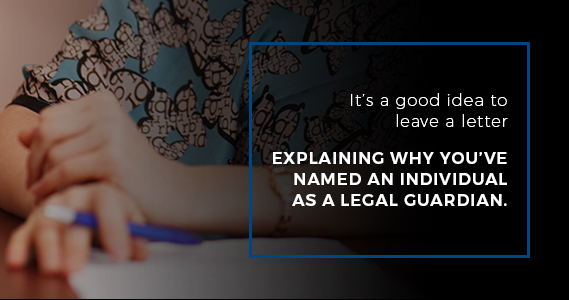
It is also a very good idea to leave a letter explaining why you have named an individual as a legal guardian. This is particularly important for any judge who may be questioning your choice.
The judge will need to consider:
- Your child’s preference.
- The conduct and moral character of the named person.
- The relationship between the potential guardian and child.
- Whom will best take care of the needs of your child?
- Whether the potential guardian will provide continuous care and stability.
If you are currently thinking about making a legal guardianship clause in your will or have any question on the process, contact us today. As a highly respected firm of guardianship attorneys near Reading, PA, we can guide you forward.
Should I Contact a Lawyer About My Custody Issues?
As you can see from this guide, there are many factors to consider when making a custody arrangement decision for your child. If you’re facing a break up and impending divorce, then it’s imperative that you take legal advice, and find a child custody attorney near Reading, PA or nearby who can persuade a court as to what the best arrangement is for you and your child.
According to the United States Census Bureau, in early 2014, there were an estimated 13.4 million parents living with 22.1 million children separately from the other parent. With this in mind, in an ideal world, you and your ex-partner will be able to reach an amicable agreement, and we can help guide you through your custody decision-making process.
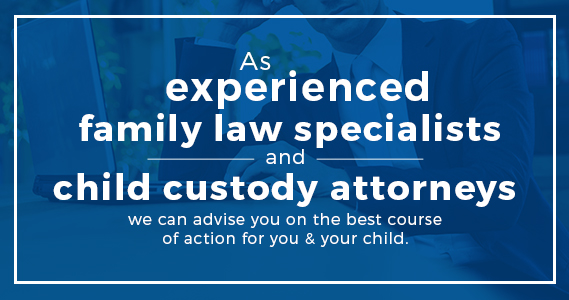
As every family and custody case is unique, it is crucial to contact us as soon as you can. As experienced family law specialists and child custody attorneys in Reading, PA, we can advise you on the best course of action for you and your child.
For your initial consultation regarding your child custody options, contact us here at the Miller Law Group, PLLC by calling 610-670-9000 or completing our online form.
Sources:
http://www.apa.org/topics/divorce/
https://www.census.gov/content/dam/Census/library/publications/2016/demo/P60-255.pdf
https://www.rocketlawyer.com/article/understanding-the-difference-between-physical-and-legal-custody.rl
http://family.findlaw.com/child-custody/types-of-child-custody.html
http://www.nolo.com/legal-encyclopedia/types-of-child-custody-29667.html
http://divorcesupport.about.com/od/maritalproblems/p/child_custody.htm
http://www.attorneys.com/child-custody/types-of-child-custody


